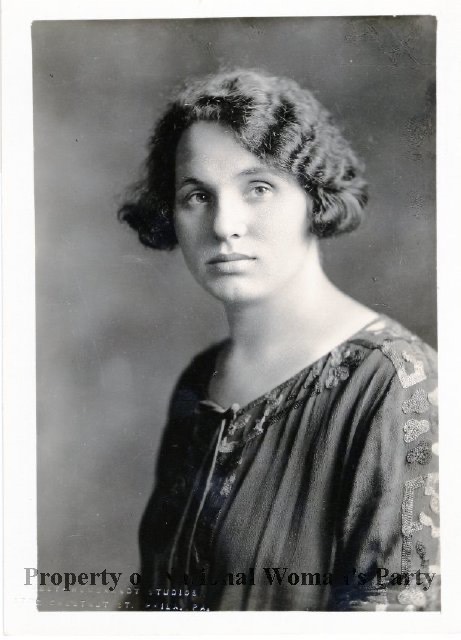
This photo of Jennie promoted her 1924 candidacy for Congress. It is stamped “Property of National Woman’s Party.”
RS Suffrage Project: Meet Jennie Dornblum
By Paula Fuchsberg, RS Suffrage Project Member
When third-generation RS member Liz Shapiro spotted a Bulletin query seeking family stories from the suffrage era, she offered up a gem: the colorful tale of her great aunt Jennie Rantz Dornblum, whose advocacy on behalf of the women’s vote heralded decades of social activism.
Jennie, a lifelong Philadelphian who lived to 102, was a “renegade and a bit of a rebel,” says Liz, who remembers her as warm and kind. In the years before the 1920 adoption of the 19th Amendment, a young Jennie championed suffrage through writings and on the city’s streets, exhorting crowds alongside the likes of Alice Paul, one of the movement’s key leaders. Family lore has it that during this period, Jennie even spent a night or more in jail.
Her efforts won praise in a 1955 memoir titled Lifting the Curtain: The State and National Woman Suffrage Campaigns in Pennsylvania as I Saw Them, by Caroline Katzenstein, a Philadelphia-based Jewish suffragist leader. Katzenstein wrote of an outdoor rally at 40th and Lancaster at which the first speech was given by “Jennie Rantz, a self- supporting young girl, who was not only an ardent Suffragist but an able and very intelligent speaker upon whom we could depend for help in the years ahead of us.”
Four years after women won the vote, the by-then married Jennie ran for Congress on the LaFollette/ Socialist ticket in Philadelphia’s Third District—one of five female Pennsylvania congressional candidates who were backed by the National Woman’s Party. The male incumbent won easily, but Jennie still drew 3,300 votes, or seven percent of the total.
Later, she was a tireless proponent of world federalism, among other causes; took over her husband Isaac’s Prudential Insurance business after his eyesight failed; helped co-found (along with Isaac) the Workmen’s Circle Home in Media; worked there full time as an executive secretary until age ninety- six; and, her grandson, Frank Aguilera says, was “unbeatable at Scrabble until the very end.” Clearly, a modest article such as this one can capture only a few highlights of such an eventful life.
Jennie, who died in 1991, typed a sixty-page memoir at an advanced age. Liz retrieved a copy a few years ago while cleaning out her mother’s home and recently read it in full for the first time. This passage offers a glimpse of Jennie’s activist mindset: “In my teens, I was a Suffragist, working for women’s rights. Speaking on street corners, before the days of radio and TV, when one went out into the streets to talk to people, distribute literature— spread the gospel. I was a zealot, sure that I knew how to save the world. And anything less than complete devotion to the Cause was sinful.” Marriage and motherhood only strengthened Jennie’s resolve. She said in a 1924 campaign brochure: “I feel more keenly the responsibility of a citizen…. I must help to make a better world for my children and all the world’s children.”

A young Jennie (top left) and siblings (clockwise) Elizabeth, Rose and Louis flank mother Frieda. [Photo courtesy of Liz Shapiro]
So what drove Jennie’s activism? The first U.S.-born child in a family of Russian Jewish immigrants (an older sister, Elizabeth, was Liz’s paternal grandmother), Jennie lost her father before she was six. To support the family, mother Frieda took in dressmaking work.
“We grew up with the daily sight of our mother sitting at the sewing machine until her head fell forward on the machine—faint or asleep,” Jennie wrote. “My mother worked day and night in her desperate efforts to keep the family together and send her children to school…. With such antecedents I grew up keenly appreciative of the public school and of freedom.”
Before long, Jennie—the “brave and strong” one in the family—helped earn money, selling newspapers under the El and interrupting her high school education to work in a type foundry. She later studied stenography at night, which equipped her with a trade; took courses at Drexel, T emple and Penn; and read and attended lectures to try to understand issues affecting working-class people.
Jennie met Isaac, then a labor organizer, when she worked for the shirtwaist makers’ union. They concluded “that the problems of the working class are the most pressing,” she wrote. “I also felt very keenly that the special handicap under which women suffered should be removed without delay.”
In later decades, the home the Dornblums built in Robin Hill, near Media, became a gathering spot for community and causes. The Jewish intelligentsia of Philadelphia often visited. And news briefs in the Delaware County Daily Times and Chester Times in the late 1940s through early 1960s noted Jennie’s active roles in, and/or her hosting of speakers from, organizations such as the League of Women Voters, the United World Federalists, the American Friends Service Committee, and the Women’s International League for Peace and Freedom.
Well into old age, family members recall, Jennie remained politically aware, opinionated, and unflaggingly positive.
For Liz, reimmersing herself in her great aunt’s story has been “so fascinating to me,” and she wishes she had “talked to Jennie a bit more.” Thanks to this project, Liz has connected with relatives she’d never met and started working with a cousin on a family tree.
And she sees one more ongoing link to Jennie—a trait that has carried through the generations, for Liz notes: “I certainly have the activism in me, that fire of righteousness.”
